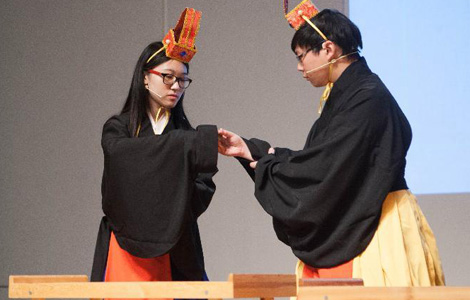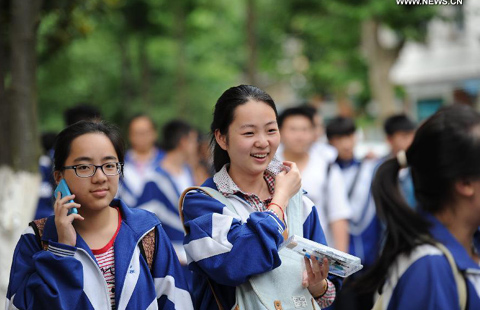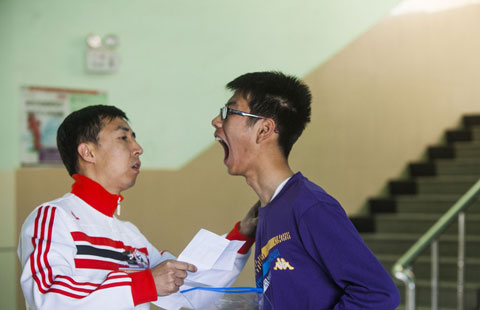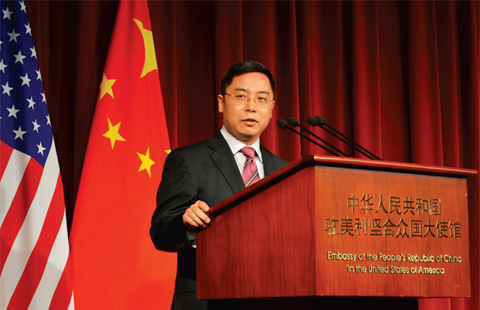China's new human rights report highlights development, rule of law
Updated: 2015-06-08 11:25
(Xinhua)
|
||||||||
Legal reform improves judicial justice
Judicial justice and transparency were greatly improved in 2014 thanks to reform measures in the judicial system.
Courts, procuratorates and police worked hard to prevent and correct unjust, false and wrongful practices from investigation and prosecution to trials.
In 2014, courts nationwide reheard 1,317 cases and corrected a number of wrongful ones.
One high-profile wrongful conviction involved a rape-murder case in 1996 by an Inner Mongolian court, in which an 18-year-old man named Huugjilt was convicted and executed. In December 2014, 18 years later, he was acquitted of the crimes.
The Supreme People's Court established a website for litigants to follow the progress of their cases and to disclose judgment papers. In 2014, a total of 6.29 million judgments were published through the website.
Procuratorates also set up a nationwide system for case procedure information inquiries, legal documentation disclosure, information disclosure of major cases and application by appointment for defense and representation.
In 2014, China revised the Administrative Litigation Law, expanding citizens' rights to sue the government and easing the procedure. Courts across the country heard 151,000 administrative first cases and concluded 131,000 of them, up 16.3 percent and 8.3 percent, respectively, from 2013.
Higher income, better education
Nationwide annual per capita disposable income reached 20,167 yuan (3,290 U.S. dollars) in 2014, up 8 percent over the previous year and faster than the economic growth rate in 2014.
Substantial efforts were made to alleviate poverty, including more government funds for infrastructure in the least-developed rural areas and relocation of people in uninhabitable regions.
By the end of 2014, the number of rural residents with an annual income less than 2,300 yuan had decreased by 12.32 million to 70.17 million.
Guarantee of educational equity has also been improved. Approximately 92.6 percent of children of school age received the nine-year compulsory education and 86.5 percent were enrolled in senior high schools.
Being the world's largest developing country, the right to development is still the most important human right in China, said Liu Huawen, secretary general of Center for Human Rights Studies of the Chinese Academy of Social Sciences.
"Easier access to health care service, better houses, stable jobs and higher income are all tangible improvements for ordinary Chinese," Liu said.
He also considered China's fierce anti-corruption campaign as a solid contribution to human rights protection, since cleaner governments and more diligent officials will take better care of people's rights and welfare.
"The concept of human rights varies in different countries and will be updated according to the changing reality. The rest of the world should respect China's unique conditions and traditions and give us more time to develop," he said.
- Human rights court hears life-support case
- Push for new developments in China's human rights
- Human rights 'progress' hailed
- China rejects US criticism of China's human rights situation
- China's human rights status improved
- Hypocrisy of US as human rights police
- China confident in human rights development

 Peking University opens Chinese traditional art courses
Peking University opens Chinese traditional art courses
 National college entrance exam ends in most parts of China
National college entrance exam ends in most parts of China
 Rescuers mourn victims on seventh day since Eastern Star disaster
Rescuers mourn victims on seventh day since Eastern Star disaster
 Rescuers enter Eastern Star hull in search efforts
Rescuers enter Eastern Star hull in search efforts
 Gaokao held across China
Gaokao held across China
 Man sues actress for staring at him
Man sues actress for staring at him
 Students prepare to take national college entrance exams
Students prepare to take national college entrance exams
 Across America (May 29- June 4)
Across America (May 29- June 4)
Most Viewed
Editor's Picks

|

|

|

|

|

|
Today's Top News
China gives its yuan to Broadway
Questions remain unresolved in the cruise ship disaster
Escaped New York prisoners may have had help from staff
Memphis hospital adds new China affiliate
Police alerted over forbidden photo shoot
Heavyweight Zhang wins unanimous decision
China mourns Yangtze shipwreck victims as search continues
China signs $50m agreement with FAO to support developing countries
US Weekly

|

|





